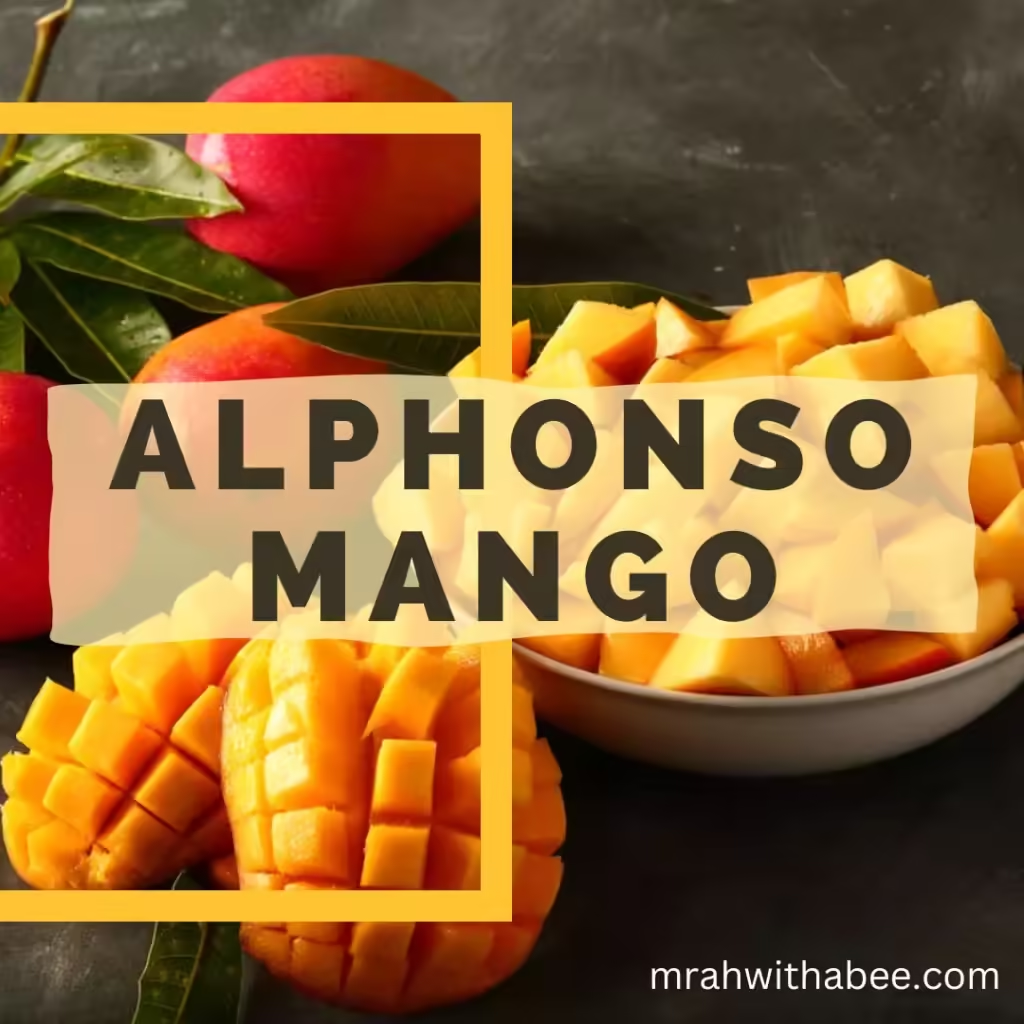Alphonso mango, often known as the “King of Mangoes,” is a famous fruit cherished for its exceptional taste, vibrant color, and unique aroma. This mango variety is known globally for its distinct flavor and holds a special place in Indian cuisine. This post will explore everything you need to know about Alphonso mangoes, from their origins and cultivation to their culinary uses and nutritional benefits.
What is Alphonso Mango?
The Alphonso mango, scientifically known as Mangifera indica, is renowned for its rich, creamy texture, vibrant golden color, and sweet flavor with a hint of citrus. Often referred to as the “King of Fruits,” it hails from India, particularly the Konkan region of Maharashtra, where it thrives in a warm, tropical climate. The Alphonso mango is famous for its premium quality, making it a sought-after export that appeals to mango lovers around the world. This unique combination of flavor and texture makes it a beloved choice for both culinary creations and fresh eating, solidifying its reputation as the “King of Fruits.”
Unique Characteristics:
- Color: Showcasing its smooth and vibrant skin, the Alphonso mango boasts a rich deep yellow to golden orange color that catches the eye.
- Size: Typically medium, this mango is easy to handle and perfect for slicing.
- Texture: Its flesh is buttery and creamy, offering a juicy bite without any stringiness, which enhances the overall eating experience.
-
Flavor: The flavor profile is sweet and aromatic, perfectly balanced with a slight acidity that adds depth and complexity to its taste.
Cultivation of Alphonso Mango
Alphonso mango trees thrive in specific conditions, which is why they are predominantly grown in India’s coastal regions.
Growing Conditions:
- Climate: Alphonso mangoes require a warm, tropical climate with high humidity to thrive, which is essential for their optimal growth. This environment not only supports fruit development but also enhances their flavor and texture. Ideal regions for cultivating these mangoes feature consistent temperatures and ample rainfall, allowing the trees to flourish and reach their full potential.
- Temperature: The ideal temperature range for cultivating Alphonso mangoes is 24–30ºC (75–86ºF). This warm range is crucial for the flowering and fruiting stages of the mango tree. While excessive heat can stress the tree, temperatures below this range may delay growth and fruit development. Maintaining a stable temperature within this range ensures healthy growth and a bountiful harvest.
- Soil: Alphonso mangoes prefer well-draining sandy loam soil to provide the right balance of nutrients and drainage. The soil must have a slightly acidic to neutral pH, preferably between 5.5 and 7.0. This type of soil promotes proper root development and prevents waterlogging, which can lead to root rot. Adding organic matter can enhance soil fertility and support the healthy growth of the mango tree.
Planting and Care:
Alphonso mango trees are typically propagated through grafting, as this method helps maintain the quality of the fruit.
- Watering: During the growing season, when the trees are actively developing flowers and fruit, Alphonso mangoes require regular watering. For healthy growth and fruit development, consistent moisture is important. However, excess water can lead to root rot and other issues, so it’s crucial to avoid waterlogging. It’s best to water the trees deeply but infrequently, allowing the soil to dry out slightly between waterings to maintain optimal conditions for root health.
- Pruning: Light pruning is beneficial for Alphonso mango trees, as it helps maintain their shape and encourages better air circulation within the canopy. You allow more sunlight to enter the tree by removing any dead or overcrowded branches, which helps support healthy growth and fruit production. Additionally, pruning helps prevent diseases by reducing humidity around the leaves and improving airflow. Regular maintenance through light pruning ensures that your mango tree remains vigorous and productive for years to come.
Nutritional Benefits
Alphonso mangoes aren’t just delicious; they’re packed with nutrients that offer multiple health benefits.
Key Nutrients:
- Vitamins: Rich in vitamins A, C, and E, which support immune health, skin health, and vision.
- Minerals: Contains potassium, which aids heart health and muscle function.
- Antioxidants: High in antioxidants, helping combat oxidative stress.
- Digestive Health: Contains dietary fiber, which supports healthy digestion and gut health.
Adding Alphonso mangoes to your diet can contribute to a balanced diet and provide a natural source of energy.
Culinary Uses
Alphonso mangoes are highly versatile and used in a variety of culinary preparations:
- Eating Fresh: Known for their incredible flavor, they’re best enjoyed as-is.
- Smoothies and Desserts: Add them to smoothies, ice creams, and yogurt for a tropical twist, or make a mango delight.
- Savory Dishes: Mangoes pair well with salsas, salads, and chutneys, adding a sweet contrast to spicy dishes.
Popular Recipes:
- Mango Lassi: A refreshing yogurt-based drink.
- Mango Salsa: Perfect for pairing with chips or grilled meat.
- Mango Salad: Tossed with fresh greens, avocado, and light dressing for a sweet and tangy salad.
How to Choose and Store Alphonso Mangoes
Selecting and storing Alphonso mangoes correctly can help retain their flavor and texture.
Tips for Choosing Ripe Mangoes:
Storing Alphonso Mangoes:
- Ripening: Place mangoes in a paper bag at room temperature to accelerate the ripening process. The bag traps ethylene gas, which the mangoes naturally produce, speeding up their ripening. Check the mangoes every day to ensure they ripen according to your desired level without becoming overripe.
- Refrigeration: Once ripe, refrigerate to extend freshness, ideally consuming within a week.
Fun Facts and Cultural Significance
The Alphonso mango has a rich history and cultural importance, particularly in India:
- Indian Culture: The Alphonso mango has a deep cultural significance in India, where it is cherished as a symbol of the country’s rich heritage. Known as the “King of Fruits,” it is celebrated in many festivals and associated with the arrival of summer, marking a time of abundance and joy. In Indian cuisine, the Alphonso mango is used in various traditional dishes, from sweet desserts like mango lassi and aamras to savory preparations such as chutneys and salads. Beyond its culinary uses, the Alphonso mango represents hospitality and is often gifted to family and friends during special occasions. Elevating dishes with its unique sweetness, vibrant color, and aroma, it has become famous among chefs and home cooks alike.
- Festivals: Celebrating the beloved fruit in all its glory, mango festivals mark the happy arrival of the mango season in India. During these festivals, Alphonso mango becomes the center of attention, highlighting their rich flavor and cultural significance through various events. Guests can partake in a range of mango-themed activities, including cooking demonstrations, fruit exhibitions, and art displays, all contributing to a lively celebration of summer and community.
- Mango as a Symbol: In India, the mango tree and its fruit are seen as symbols of prosperity and fertility. They carry deep cultural significance, representing abundance and good fortune.
Conclusion
FAQs
1. Where do Alphonso mangoes come from?
Alphonso mangoes primarily come from the Konkan region of Maharashtra, India.
2. How do I know if an Alphonso mango is ripe?
A ripe Alphonso mango has a rich golden color and emits a sweet, fruity aroma near the stem.
3. What are the health benefits of Alphonso mangoes?
They are rich in vitamins A, C, and E, potassium, and antioxidants, supporting immunity, skin health, and heart health.
4. Can I grow an Alphonso mango tree at home?
Yes, but they require warm tropical climates and ample sunlight, so check if your environment is suitable for their growth.
5. How long do Alphonso mangoes stay fresh in the refrigerator?
Once ripe, they can stay fresh for up to a week when stored in the refrigerator.



